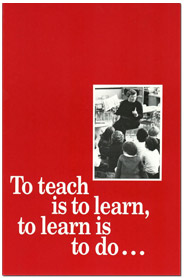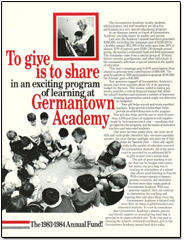Allen MAC contracted with me to write copy for Germantown Academy’s annual fund solicitation brochure and flyer. The school is in Fort Washington, Pennsylvania.
Annual Fund Solicitation Brochure
To teach is to learn, to learn is to do at Germantown Academy

From Socrates to Mortimer Adler, the world’s great teachers are, first of all, great learners. They are curious about the world and about themselves. They love ideas and are willing to express those ideas, regardless of the cost to either cherished assumptions or personal freedom.
Great teachers discover their own individual alchemies of theory and theatrics, fact and fancy, listening and leading, urgency and understanding. They make each lesson and, more important, each learner come alive to his or her own power to take hold of an idea (or a spatula) and do something with it.
Germantown Academy is characterized by such teaching and such learning. Their value is proved in a thousand or more small deeds done each day by those students and teachers whose lives together are Germantown Academy.
Teachers at Germantown Academy, like all great teachers throughout history, make students want to learn. Because they are learners themselves, still vitally interested in their subjects, in discovery, and in the students they work with every day, they are worthy mentors who are remembered long after the last class of the year.
Teaching at Germantown Academy is really a cooperative enterprise in which teachers and students learn together. This learning process is centered around hands-on experience, whether it be in building sentences or model satellites, exploring a cell or the seashore, debating about the crusades or public policy.
For example, during the past two years, fifth graders at Germantown Academy have participated in a special Endangered Species Program. The 10-week study requires students to research and report on an animal in danger of extinction, to take on projects to preserve a species, and to present to the Lower School an “Endangered Species World Conference” that culminates the study.
Designed by teachers Susan Hunsinger-Hoff, Phyllis Chauveau, Sandra Bennett, and Diane Dunning, the Endangered Species Program typifies many at Germantown in that it requires students to engage themselves actively in the learning process.
“Learning-by-doing” is not new, nor is it unique to Germantown Academy. What is unique is the broad application of such an active approach to education by virtually all the school’s teachers and the far-reaching success that results.
Students in David Leshan’s Upper School English classes learn to appreciate the works of master writers by creating original literature of their own.
After producing a documentary about the Community High School of Philadelphia, students in Angela Kast’s video documentary class invite students and faculty from CHS to the Germantown campus for a screening.
Physics students in Joseph Schemer’s alternate energy technology course apply their knowledge by building a solar water heater and a solar water still for the chemistry lab.
Charley Muir’s first graders research, write and produce a videotaped program called “Don’t Let the Stars Get in Your Eyes” after a class trip to the planetarium.
Honors students in Craig Merow’s algebra class interview professional mathematicians who’ve agreed to talk to them about real-world applications of the lessons they learn in class.
In planning and implementing projects like these, teachers at Germantown Academy devote many extra hours to outside preparation. They also accept the responsibility for high levels of energetic involvement with their students.
The learning environment they create is in many ways more difficult to manage than one in which the teacher uses more traditional lecture techniques. Control must be constant, yet subtle. The teacher must participate as well as lead, listen as well as speak, learn as well as teach.
Although the active approach to education clearly demands more of teachers than many of the more traditional approaches, the greater effort pays off in greater rewards.
Students at Germantown Academy are motivated, interested, and enthusiastic about their studies. They put in extra hours on homework because they want to participate actively in their classes. They ask for extra sections of “Advanced Latin” and “Ancient Egypt” courses to be created. They give up lunch hours to develop fencing skills beyond those picked up in the regular meeting of the fencing class. They score well on national achievement tests and are admitted to some of the nation’s most prestigious colleges and universities. They develop an understanding of the special kind of learning that comes from doing—an understanding that serves them throughout their adult lives.
As Germantown Academy’s teachers observe these developments in their students, they are justifiably proud. They share the learning process with their students as it unfolds. They laud extra effort. They celebrate discoveries, large or small. They, too, are motivated, interested and enthusiastic. They, too, are willing to put in extra hours, enjoying the assignments their students have prepared, teaching the extra class sections, skipping lunch or giving up a Saturday to provide extra coaching.
Most important of all, these teachers experience firsthand the joy of learning more about their disciplines, more about their students, and more about themselves through the special kind of active teaching that distinguishes them as members of the faculty of Germantown Academy.
Facts about Teaching and Learning at Germantown Academy
First graders are learning about the animal world by caring for their own rabbit.
All students in the Upper School and all faculty members read George Orwell’s 1984 in preparation for this fall’s English class discussions of the book and its implications.
Each of the Germantown Academy’s two college counselors will spend at least six hours a day working with the college admission program in addition to teaching classes. Germantown Academy’s two college counselors have visited the campuses of more than 100 colleges during the last five years.
Ninth graders spend three of each five science class meetings in the laboratory.
The menagerie of the Lower School science program consists of the following animals: three hermit crabs, five lizards, two frogs, two guinea pigs, four hamsters, two mice, two gerbils, and a variety of visiting animals.
Upper School students have access to 15,909 volumes in their library. The Lower School library contains 12,000 volumes.
The Dean of Boys and the Dean of Girls in the Upper School held an average of 40 parent conferences last year.
On the reading list for ninth graders will be The Adventures of Huckleberry Finn, Catcher in the Rye, the Bible, The Odyssey, and five or six plays.
When asked for an estimate of the number of hours they spend advising students, several of Germantown Academy’s teachers thought a minute and said, “continually.”
Annual Fund Solicitation Flyer
To give is to share in an exciting program of learning at Germantown Academy

The Germantown Academy faculty, students, administrators, and staff members are all active participants in a very special educational program.
As an alumnus, parent or friend of Germantown Academy, you help assure its quality and success.
Last year, the Academy’s annual fund drive generated $288,000, exceeding the campaign goal of $230,000 by a healthy margin. $92,000 of the total came from 38% of alumni. 63% of parents gave $180,130 through annual giving, the teacher’s retirement fund and debt retirement. The remainder came from a special group of “Friends,” former parents, grandparents, and other individuals in the community who have a special interest in the quality of education.
This year’s campaign goal is 40% participation from alumni to generate total contributions of $80,000. The goal for parents is 70% participation to generate $190,000; the Friends’ goal is $30,000.
Your generous support of Germantown Academy’s annual fund drive provides about 5% of its operating budget for the year. This money, added to tuition payments, provides a critical financial margin that allows the school’s teachers and students a number of important learning opportunities which might not otherwise be budgeted.
Your gift helps recruit and retain excellent teachers, helps provide scholarships, helps provide an added dimension to the program. Your gift also helps provide one or more of more than 4,000 purchases of equipment and supplies made by Germantown each year—purchases that go right into the program, into the hands of dedicated teachers and interested students.
One more lacrosse goalie stick, one more set of fifth and sixth grade chemistry kits, one more assembly speaker, one more theater spotlight, one more set of filmstrips for Spanish class— these add significantly to the quality of education received by Germantown students. All of the above could be provided by an additional $670 in gifts to next year’s annual fund.
The gift of good teaching is not one that can be bought with money, but money can go a long way in creating an atmosphere at a school that allows good teaching to flourish. With a proper margin of support, genuine creativity and innovation become more than empty goals at Germantown Academy. With your generous support, they can continue to characterize the teaching and learning that take place there every day.
Germantown Academy is blessed with more than its share of gifted teachers and interested students. It is not by coincidence that Germantown Academy’s alumni, parents and friends support an annual giving fund that is growing at an unprecedented rate. To do your part in insuring the school’s continued excellence, give to the Germantown Academy annual fund drive today.
Let’s Talk About Your Marketing Communications Goals and Challenges!
If you’re looking for help with writing, graphic design and marketing communications and you like the portfolio samples you see here, contact me to schedule a telephone call to explore the possibilities of a collaboration. Of course, there is no cost or obligation for the call.